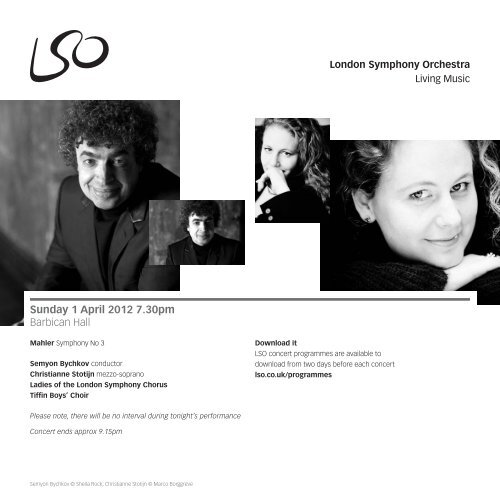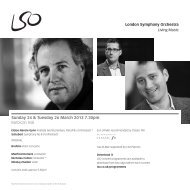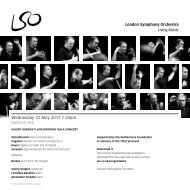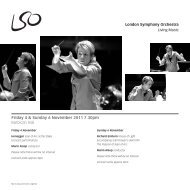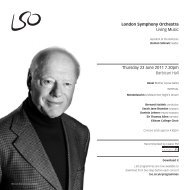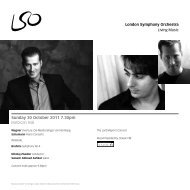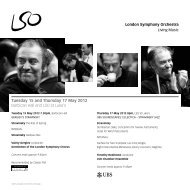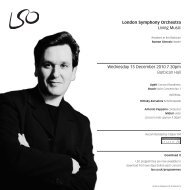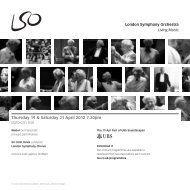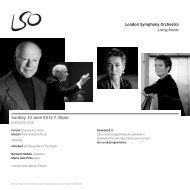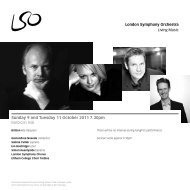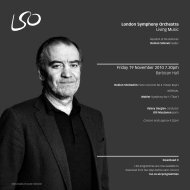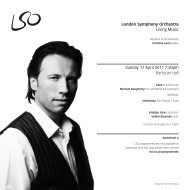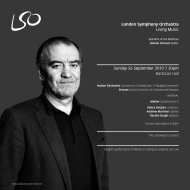1 April programme PDF - London Symphony Orchestra
1 April programme PDF - London Symphony Orchestra
1 April programme PDF - London Symphony Orchestra
Create successful ePaper yourself
Turn your PDF publications into a flip-book with our unique Google optimized e-Paper software.
Sunday 1 <strong>April</strong> 2012 7.30pm<br />
Barbican Hall<br />
Mahler <strong>Symphony</strong> No 3<br />
Semyon Bychkov conductor<br />
Christianne Stotijn mezzo-soprano<br />
Ladies of the <strong>London</strong> <strong>Symphony</strong> Chorus<br />
Tiffin Boys’ Choir<br />
Please note, there will be no interval during tonight’s performance<br />
Concert ends approx 9.15pm<br />
Semyon Bychkov © Sheila Rock; Christianne Stotijn © Marco Borggreve<br />
Download it<br />
LSO concert <strong>programme</strong>s are available to<br />
download from two days before each concert<br />
lso.co.uk/<strong>programme</strong>s<br />
<strong>London</strong> <strong>Symphony</strong> <strong>Orchestra</strong><br />
Living Music
Welcome News<br />
Welcome to this LSO concert conducted by Semyon Bychkov and<br />
featuring mezzo-soprano Christianne Stotijn.<br />
Semyon Bychkov returns to the LSO after a successful debut with<br />
the <strong>Orchestra</strong> in March 2010, prompting The Telegraph to write<br />
‘Semyon Bychkov breezed into the Barbican … with a <strong>programme</strong><br />
that sparkled from the start’. Noted for his Mahler, Wagner and<br />
Strauss in particular, we look forward to his interpretation of Mahler’s<br />
mighty third symphony.<br />
Semyon Bychkov will conduct alongside Dutch mezzo-soprano<br />
Christianne Stotijn. Christianne trained as a violinist, only fully turning<br />
to singing some twelve years ago. To complete the picture, it is a<br />
pleasure to welcome the Ladies of the <strong>London</strong> <strong>Symphony</strong> Chorus<br />
and Tiffin Boys’ Choir.<br />
Coming up we have a return from LSO Principal Guest Conductor<br />
Daniel Harding (12 <strong>April</strong>) and later in the month, Sir Colin Davis<br />
conducts one of his favourite operas in concert version – Weber’s<br />
Der Freischütz.<br />
Kathryn McDowell<br />
LSO Managing Director<br />
BMW LSO Open Air Classics: just over a month away<br />
On Saturday 12 May 2012, at 6.30pm in Trafalgar Square, the LSO and<br />
Principal Conductor Valery Gergiev will perform Stravinsky’s Fireworks,<br />
The Firebird and The Rite of Spring as part of a ground-breaking<br />
new series of annual outdoor summer concerts, in a three-year<br />
partnership with BMW. 100 young musicians from East <strong>London</strong> will<br />
also perform The Lite of Spring, an arrangement of Stravinsky’s work<br />
by Gareth Glyn. Presenter Paul Rissmann will guide us through the<br />
evening. The concert is free and no booking is required – turn up<br />
early to beat the crowds!<br />
lso.co.uk/openair<br />
Solo Bach at LSO St Luke’s<br />
May sees four solo Bach recitals at LSO St Luke’s as part of our regular<br />
BBC Radio 3 Lunchtime Concert series. Bach’s timeless works are<br />
a monument to the birth of classical music as we know it today.<br />
To perform masterworks including the Cello Suites and selected<br />
Preludes and Fugues from The Well-Tempered Clavier we welcome<br />
Cédric Tiberghien (piano), Pieter Wispelwey (cello), Isabelle Faust<br />
(violin) and Mahan Esfahani (harpischord). If you haven’t yet<br />
experienced a lunchtime concert, or enjoyed the stunning setting<br />
of LSO St Luke’s (or the equally enticing café), now’s your chance.<br />
Tickets are just £10 (£9 concessions).<br />
lso.co.uk/lunchtimeconcerts<br />
Music’s better shared!<br />
The LSO offers great benefits for groups of 10+ including 20% off<br />
standard ticket prices, a dedicated Group Booking phone line and<br />
priority booking, free interval hot drinks and, for bigger groups,<br />
the chance of a private interval reception. To reserve tickets, call<br />
the dedicated Group Booking line on 020 7382 7211. If you have<br />
general queries, please call LSO Groups Rep Fabienne Morris on<br />
020 7382 2522. At tonight’s concert, we are delighted to welcome:<br />
Conservatorio Profesional de Música ‘Miguel Fleta’<br />
de Monzón, Spain<br />
2 Welcome & News Kathryn McDowell © Camilla Panufnik
Mahler the Man<br />
by Stephen Johnson<br />
Mahler’s sense of being an outsider, coupled with a penetrating,<br />
restless intelligence, made him an acutely self-conscious searcher<br />
after truth. For Mahler the purpose of art was, in Shakespeare’s famous<br />
phrase, to ‘hold the mirror up to nature’ in all its bewildering richness.<br />
The symphony, he told Jean Sibelius, ‘must be like the world. It must<br />
embrace everything’. Mahler’s symphonies can seem almost over-full<br />
with intense emotions and ideas: love and hate, joy in life and terror of<br />
death, the beauty of nature, innocence and bitter experience. Similar<br />
themes can also be found in his marvellous songs and song-cycles,<br />
though there the intensity is, if anything, still more sharply focused.<br />
Gustav Mahler was born the second of 14 children. His parents<br />
were apparently ill-matched (Mahler remembered violent scenes),<br />
and young Gustav grew dreamy and introspective, seeking comfort<br />
in nature rather than human company. Death was a presence from<br />
early on: six of Mahler’s siblings died in infancy. This no doubt partly<br />
explains the obsession with mortality in Mahler’s music. Few of his<br />
major works do not feature a funeral march: in fact Mahler’s first<br />
composition (at age 10) was a Funeral March with Polka – exactly<br />
the kind of extreme juxtaposition one finds in his mature works.<br />
For most of his life Mahler supported himself by conducting, but<br />
this was no mere means to an end. Indeed his evident talent and<br />
I am …<br />
three times homeless<br />
a native of Bohemia in Austria<br />
an Austrian among Germans<br />
a Jew throughout the world.<br />
energetic, disciplined commitment led to successive appointments<br />
at Prague, Leipzig, Budapest, Hamburg and climactically, in 1897, the<br />
Vienna Court Opera. In the midst of this hugely demanding schedule,<br />
Mahler composed whenever he could, usually during his summer<br />
holidays. The rate at which he composed during these brief periods<br />
is astonishing. The workload in no way decreased after his marriage<br />
to the charismatic and highly intelligent Alma Schindler in 1902.<br />
Alma’s infidelity – which almost certainly accelerated the final decline<br />
in Mahler’s health in 1910–11 – has earned her black marks from<br />
some biographers; but it is hard not to feel some sympathy for her<br />
position as a ‘work widow’.<br />
Nevertheless, many today have good cause to be grateful to<br />
Mahler for his single-minded devotion to his art. T S Eliot – another<br />
artist caught between the search for faith and the horror of<br />
meaninglessness – wrote that ‘humankind cannot bear very much<br />
reality’. But Mahler’s music suggests another possibility. With his ability<br />
to confront the terrifying possibility of a purposeless universe and<br />
the empty finality of death, Mahler can help us confront and endure<br />
stark reality. He can take us to the edge of the abyss, then sing us<br />
the sweetest songs of consolation. If we allow ourselves to make<br />
this journey with him, we may find that we too are the better for it.<br />
Programme Notes<br />
3
Gustav Mahler (1860–1911)<br />
<strong>Symphony</strong> No 3 in D Minor (1895–96)<br />
Part One<br />
1 Kräftig: Entschieden (Powerful, Resolute)<br />
Part Two<br />
2 Tempo di Menuetto – Sehr mässig (At a very moderate pace)<br />
3 Comodo: Scherzando – Ohne Hast (Unhurried)<br />
4 Sehr langsam (Very slow) – Misterioso<br />
5 Lustig im Tempo und keck im Ausdruck<br />
(At a jaunty tempo with bold expression)<br />
6 Langsam – Ruhevoll – Empfunden<br />
(Slow – Peaceful – With Feeling)<br />
Christianne Stotijn mezzo-soprano<br />
Ladies of the <strong>London</strong> <strong>Symphony</strong> Chorus<br />
Tiffin Boys’ Choir<br />
4 Programme Notes<br />
‘It’s all very well, but you can’t<br />
call that a symphony.’<br />
William Walton’s brusque dismissal of Mahler’s Third <strong>Symphony</strong><br />
may strike some readers as provincial today. But there was a time<br />
when musically minded people would have agreed with him. After<br />
the symphony’s 1904 Viennese premiere, a critic stated that Mahler<br />
ought to be sent to jail for perpetrating such an insult to the intelligent<br />
listener. But amid the scandalised, outraged comments one can find<br />
equally impassioned praise. After hearing that same 1904 Viennese<br />
performance, the young Arnold Schoenberg (who had at first been<br />
hostile to Mahler) told the composer that the symphony had revealed<br />
to him ‘a human being, a drama, truth, the most ruthless truth!’.<br />
It isn’t hard to see why the Third <strong>Symphony</strong> should provoke such<br />
extreme reactions. In concept – and in some of its content – it is<br />
Mahler’s most outrageous work. The forces may be smaller (slightly)<br />
than those used in <strong>Symphony</strong> No 2 (‘Resurrection’) or the so-called<br />
‘<strong>Symphony</strong> of a Thousand’ (No 8), but in other respects it is incredibly<br />
ambitious. Mahler is quoted as saying that ‘the symphony must be<br />
like the world. It must embrace everything’, in which case the Third is<br />
his most ‘symphonic’ work. ‘Just imagine a work of such magnitude<br />
that it actually mirrors the whole world’, Mahler wrote to the singer<br />
Anna von Mildenburg, ‘My [third] symphony will be something the<br />
like of which the world has never heard!’. In this music, he wrote,<br />
‘the whole of nature finds a voice … Some passages in it seem so<br />
uncanny that I can hardly recognise them as my own work’.<br />
At first Mahler thought of giving the Third <strong>Symphony</strong> a title. It was<br />
to be called ‘Pan’, after the Greek god of nature, or ‘The Joyful<br />
Science’, after one of Nietzsche’s philosophical works, Die fröhliche<br />
Wissenschaft. The Third <strong>Symphony</strong> contains, in its fourth movement,<br />
a setting of lines from Nietzsche’s Also sprach Zarathustra (Thus<br />
Spake Zarathustra), the work which first puts forward the ideal of<br />
the ‘Superman’, the man who can embrace life – nature – in all its<br />
fullness, whether glorious or terrible. This message struck chords<br />
in Mahler himself, as he noted after writing the symphony’s second<br />
movement: ‘It always strikes me as odd … think only of flowers,
little birds, and woodsy smells. No one knows the god Dionysus,<br />
the great Pan. There now! You have a sort of <strong>programme</strong> – that is,<br />
an example of how I make music. Everywhere and always it is only<br />
the voice of nature!’.<br />
As to that ‘<strong>programme</strong>’, Mahler was prepared to be more specific.<br />
He described the symphony’s six movements as follows:<br />
Summer marches in<br />
What the flowers of the meadow tell me<br />
What the animals of the forest tell me<br />
What night tells me (mankind)<br />
What the morning bells tell me (the angels)<br />
What love tells me.<br />
A plan emerges, in which each movement seems to aspire higher<br />
than the one before it: the awakening of elemental nature leads<br />
ultimately to transcendent love. But around the time of the Third<br />
<strong>Symphony</strong> Mahler seems to have lost faith in titles and literary<br />
<strong>programme</strong>s. Let the music speak for itself – or in the words of<br />
the Bible, ‘He that hath an ear, let him hear’. This undoubtedly made<br />
it harder for earlier audiences to grasp the Third <strong>Symphony</strong>’s<br />
meaning, but modern listeners may be thankful for the freedom<br />
Mahler gives them. After all, the music is vividly suggestive. If we<br />
can forget old-fashioned notions of what a symphony ‘should’ be,<br />
and set our minds free to explore its imaginative riches, then the<br />
Third <strong>Symphony</strong> can explain itself with a logic that is part musical,<br />
part dreamlike, but always compelling.<br />
Nevertheless, some preparation is needed for the symphony’s<br />
extraordinary proportions. The first movement is vast: around 35<br />
to 40 minutes in most performances – longer than the next four<br />
movements put together. Attempt to make sense of its structure<br />
along traditional formal lines and you will soon get lost. In essence<br />
it alternates three kinds of music: the dark, primordial sounds of the<br />
opening (described by Mahler as ‘Pan awakes’), pastoral sounds<br />
(murmurous wind and string trills, woodwind birdcalls), and gaudy<br />
military march music (brass fanfares, dotted rhythms and plenty<br />
of percussion). Eventually it is the latter music which dominates<br />
‘summer marches in’. The ‘flowers of the meadow’ minuet that<br />
follows is on a much more intimate scale, with hints of folk music,<br />
delicately scored. The naïve exuberance of the ‘animals of the forest’<br />
third movement is twice interrupted by solos from a distant post-horn,<br />
sounding magically through hushed high strings – a nostalgic memory,<br />
or perhaps an evocation of primal innocence. Near the end of this<br />
movement comes a ferocious fortissimo outburst for almost the<br />
whole orchestra. Pan is revealed again.<br />
Mankind’s struggle to make sense of the world, its joy and grief,<br />
is the subject of the Nietzsche setting, almost all of it delivered<br />
in an awe-struck pianissimo. Then the sound of bells (literally and<br />
impersonated by the boys’ choir) introduces the angels’ song of<br />
childlike rapture at God’s forgiveness of the apostle Peter. Finally<br />
comes the symphony’s true slow movement. An intense hymn-like<br />
theme for strings alternates with music that seems more troubled,<br />
searching. Sounds from earlier in the symphony return, then the<br />
hymn builds to a radiant major-key climax. Mahler revealed to Anna<br />
von Mildenburg that he had in mind a motto for this movement:<br />
‘Father, see these wounds of mine! Let no creatures of yours be lost!’<br />
(Vater, sieh an die Wunden mein! Kein Wesen lass verloren sein!).<br />
His next words probably say more than any about the message<br />
he embedded in his Third <strong>Symphony</strong>. ‘I could almost call this [the<br />
finale] ‘What God tells me’. And truly, in the sense that God can<br />
only be understood as love. And so my work begins as a musical<br />
poem embracing all stages of development in a step-wise ascent.<br />
It begins with an inanimate nature and ascends to the love of God’.<br />
Programme Note © Stephen Johnson<br />
Stephen Johnson is the author of Bruckner Remembered (Faber). He<br />
also contributes regularly to the BBC Music Magazine, and broadcasts<br />
for BBC Radio 3 (Discovering Music), Radio 4 and the World Service.<br />
Programme Notes<br />
5
Gustav Mahler<br />
<strong>Symphony</strong> No 3: Libretto (part two, movements four and five)<br />
Sehr langsam (Very slow) – Misterioso<br />
O Mensch! Gib Acht!<br />
Was spricht die tiefe Mitternacht?<br />
‘Ich schlief, aus tiefem Traum bin ich erwacht.<br />
Die Welt ist tief,<br />
Und tiefer, als Tag gedacht.<br />
Tief ist ihr Weh!<br />
Lust, tiefer noch als Herzeleid!<br />
Weh spricht: Vergeh!<br />
Doch alle Lust will Ewigkeit!<br />
Will tief, tiefe Ewigkeit.’<br />
Lustig im Tempo und keck im Ausdruck<br />
(At a jaunty tempo with bold expression)<br />
Es sungen drei Engel einen süssen Gesang;<br />
Mit Freuden es selig in dem Himmel klang,<br />
Sie jauchtzen fröhlich auch dabei,<br />
Dass Petrus sei von Sünden frei.<br />
Und als der Herr Jesus zu Tische sass,<br />
Mit seinen zwölf Jüngern das Abendmahl ass,<br />
Da sprach der Herr Jesus: ‘Was stehst du denn hier?<br />
Wenn ich dich anseh’, so weinest du mir.’<br />
‘Und sollt’ ich nicht weinen, du gütiger Gott?<br />
Ich hab übertreten die zehn Gebot.<br />
Ich gehe und weine ja bitterlich.<br />
Ach komm’ und erbarme dich über mich!’<br />
‘Hast du denn übertreten die zehn Gebot,<br />
So fall auf die Knie and bete zu Gott!<br />
Liebe nur Gott in alle Zeit!<br />
So wirst du erlangen die himmlische Freud’.<br />
Die himmlische Freud’ ist eine selige Stadt.<br />
Die himmlische Freud’, die kein Ende mehr hat!<br />
Die himmlische Freud war Petro bereit’t,<br />
Durch Jesum, und Allen zur Seligkeit.<br />
‘O Mensch’ from Friedrich Nietzsche’s Also sprach Zarathustra<br />
‘Es sungen drei’ from Arnim & Brentano’s Des Knaben Wunderhorn<br />
6 Libretto<br />
O Man! Take heed!<br />
What does the deep midnight say?<br />
‘I was asleep, from deep dreams I have awoken.<br />
The world is deep,<br />
And deeper than the day imagined.<br />
Deep is its grief!<br />
Joy, deeper still than heartache!<br />
Grief says: Die!<br />
But all joy seeks eternity,<br />
Seeks deep, deep eternity.’<br />
Three angels were singing a sweet song,<br />
In blissful joy it rang through heaven.<br />
They shouted too for joy,<br />
That Peter was set free from sin.<br />
And as the Lord Jesus sat at table,<br />
And ate the supper with his disciples,<br />
Lord Jesus said: ‘Why do you stand here?<br />
When I look at you, you weep at me.’<br />
‘And should I not weep, thou bounteous God?<br />
I have broken the ten commandments.<br />
I wander weeping bitterly,<br />
O come and have mercy on me!’<br />
‘If you have broken the ten commandments,<br />
Then fall on your knees and pray to God!<br />
Love only God all the time!<br />
Thus will you gain heavenly joy.’<br />
Heavenly joy is a blessed city,<br />
Heavenly joy, that has no end!<br />
Heavenly joy was granted to Peter,<br />
Through Jesus, and to all men for eternal bliss.
Semyon Bychkov<br />
Conductor<br />
‘Bychkov showed why he<br />
has become one of the<br />
world’s leading conductors,<br />
with an elegant style that<br />
mixes calm authority and<br />
persuasive heart.’<br />
The Sunday Telegraph, BBC Proms 2011<br />
Since leaving St Petersburg in the mid 1970s,<br />
Semyon Bychkov has been a guest on the<br />
podiums of the world’s finest orchestras.<br />
With his time carefully balanced between<br />
operatic and symphonic repertoire, he<br />
enjoys long and fruitful relationships with<br />
the orchestras and major opera houses in<br />
<strong>London</strong>, Paris, Vienna, Milan, Berlin, Chicago<br />
and New York.<br />
Bychkov has held the posts of Music Director<br />
of Buffalo Philharmonic <strong>Orchestra</strong> and<br />
Orchestre de Paris, Principal Guest Conductor<br />
of the St Petersburg Philharmonic and of<br />
Maggio Musicale Florence, Chief Conductor<br />
Semyon Bychkov © Sheila Rock<br />
of WDR Sinfonieorchester Köln and of the<br />
Dresden Semperoper.<br />
Recent highlights have included tours with<br />
the Filarmonica della Scala in Asia and<br />
Europe; the Concertgebouw in Europe;<br />
and the Vienna Philharmonic in the US,<br />
and engagements with the Cleveland and<br />
Philadelphia <strong>Orchestra</strong>s, the San Francisco<br />
<strong>Symphony</strong>, Munich Philharmonic and<br />
the Gewandhausorchester Leipzig. In the<br />
2011/12 season, he appears with the Berlin<br />
Philharmonic, the Chamber <strong>Orchestra</strong> of<br />
Europe, the NDR Sinfonieorchester Hamburg,<br />
the <strong>London</strong>, Chicago, San Francisco <strong>Symphony</strong><br />
<strong>Orchestra</strong>s, the Russian National <strong>Orchestra</strong>,<br />
Munich and Los Angeles Philharmonics,<br />
and the <strong>Orchestra</strong> Sinfonica Nazionalle<br />
della RAI Turin.<br />
Bychkov made his Covent Garden debut<br />
in 2003 with a new production of Elektra<br />
and returned later that year to conduct<br />
Boris Godunov. He has since conducted<br />
Queen of Spades (2006), Lohengrin (2009),<br />
Don Carlos (2009) and Tannhäuser (2010)<br />
at Covent Garden, and Boris Godunov (2004)<br />
and Otello (2007) at the Met, New York.<br />
He returns to Covent Garden to conduct a<br />
La bohème in May 2012, and will conduct<br />
Otello at the Met in 2013. In Italy, Bychkov<br />
conducted Tosca (1996) and Elektra (2005)<br />
at La Scala, Milan; a new production of<br />
Don Carlo in Torino (2006); and numerous<br />
productions at Maggio Musicale Florence,<br />
including award-winning productions of<br />
Jenu˚fa (1993), Schubert’s Fierrabras (1995)<br />
and Lady Macbeth of Mtsensk (1997).<br />
Bychkov made his Paris Opera debut with<br />
Ballo in Maschera (2007) and returned to<br />
conduct Tristan und Isolde (2009); at the<br />
Vienna State Opera he has conducted<br />
Elektra (2000), Tristan und Isolde (2001),<br />
Daphne (2003) and Lohengrin (2005), and<br />
Der Rosenkavalier (2005) at the Salzburg<br />
Festival. He opened the 2011/12 season of<br />
the Teatro Real Madrid with highly acclaimed<br />
performances of Elektra, and will return to<br />
the house in 2016 for Parsifal.<br />
Bychkov’s recent recording of Strauss’ Alpine<br />
<strong>Symphony</strong> coupled with Till Eulenspiegel<br />
(Profil) follows a series of benchmark Strauss<br />
recordings including Ein Heldenleben<br />
and Metamorphosen (Avie), Daphne with<br />
Renée Fleming (Decca) and Elektra with<br />
Deborah Polaski (Profil). Also with WDR<br />
Sinfonieorchester Köln are recordings of<br />
Mahler, Shostakovich, Rachmaninov, the<br />
complete cycle of Brahms Symphonies,<br />
and Verdi’s Requiem. Both the Brahms and<br />
Rachmaninov symphonies (<strong>Symphony</strong> No 2,<br />
Symphonic Dances and The Bells) are also<br />
available on DVD (Arthaus). Winner of BBC<br />
Music Magazine’s Record of the Year 2010,<br />
Bychkov’s recording of Wagner’s Lohengrin<br />
was committed to disc following staged<br />
performances at the Vienna Staatsoper and<br />
concert performances in Cologne.<br />
The Artists<br />
7
Christianne Stotijn<br />
Mezzo-soprano<br />
‘Her instrument is a fine<br />
one … her musical manner<br />
and emotional steering<br />
were quietly confident and<br />
ultimately compelling.’<br />
Igor Toronyi-Lalic, The Arts Desk, on<br />
Christianne Stotijn & the LSO, October 2009<br />
Mezzo-soprano Christianne Stotijn, a native<br />
of Delft in The Netherlands, completed her<br />
solo violin studies in 2000, after which she<br />
followed an intensive vocal course with Udo<br />
Reinemann at the Amsterdam Conservatory.<br />
She furthered her vocal studies with Jard van<br />
Nes, Noelle Barker and Dame Janet Baker.<br />
Over the years Christianne has won numerous<br />
awards, including the prestigious ECHO Rising<br />
Stars Award 2005/6, the Borletti-Buitoni Trust<br />
Award in 2005, and the Nederlands Muziekprijs<br />
in 2008. Additionally she was selected as<br />
BBC New Generation Artist in 2007.<br />
Accompanied by pianists Joseph Breinl<br />
and Julius Drake, with whom she has a<br />
longstanding duo partnerships, she performs<br />
regularly in the world’s leading concert<br />
venues, including the Wigmore Hall in<br />
<strong>London</strong>, the Amsterdam Concertgebouw’s<br />
Main Hall and Recital Hall, Vienna’s<br />
Musikverein and Konzerthaus, Carnegie Hall<br />
in New York, Théâtre des Champs-Elysées<br />
and Théâtre du Châtelet in Paris, the Salzburg<br />
Mozarteum, the Palais des Beaux-Arts in<br />
Brussels, Kennedy Center in Washington and<br />
Atlanta’s Spivey Hall. Christianne made her<br />
Berlin Philharmonic debut in a performance<br />
of Schoenberg’s Das Buch der Hängenden<br />
Gärten, accompanied by Mitsuko Uchida.<br />
The conductor Bernard Haitink has had a<br />
profound influence on Christianne Stotijn’s<br />
career. After successful performances of<br />
Mahler’s Rückert-Lieder with the Orchestre<br />
National de France and the Concertgebouw<br />
<strong>Orchestra</strong>, Haitink invited her to perform<br />
Mahler’s <strong>Symphony</strong> No 2 at the BBC Proms,<br />
Beethoven’s <strong>Symphony</strong> No 9 at the Lucerne<br />
Festival, the Rückert-Lieder with the Chicago<br />
<strong>Symphony</strong> <strong>Orchestra</strong>, the Matthäus-Passion<br />
with the Boston <strong>Symphony</strong> <strong>Orchestra</strong> and<br />
Das Lied von der Erde with the LSO.<br />
Christianne has also worked with world-class<br />
conductors such as Claudio Abbado, Vladimir<br />
Jurowski, Ivan Fischer, Gustavo Dudamel,<br />
Yannick Nézet-Séguin, Jaap van Zweden, Marc<br />
Minkowski, René Jacobs, Charles Dutoit and<br />
Andris Nelsons, and orchestras including the<br />
Berlin Philharmonic, LSO, Royal Concertgebouw<br />
<strong>Orchestra</strong>, Orchestre National de France,<br />
Rotterdam Philharmonic <strong>Orchestra</strong>, <strong>London</strong><br />
Philharmonic <strong>Orchestra</strong>, Chicago <strong>Symphony</strong><br />
<strong>Orchestra</strong>, Boston <strong>Symphony</strong> <strong>Orchestra</strong> and<br />
the Symphonieorchester des Bayerischen<br />
Rundfunks.<br />
Christianne Stotijn also appears regularly on<br />
the stage. She has sung the role of Pauline in<br />
Pique Dame at the Paris Opera, Ottavia in<br />
Poppea at the Nederlandse Opera and Cornelia<br />
in Giulio Cesare at the Théâtre de la Monnaie<br />
in Brussels and De Nederlandse Opera.<br />
Christianne sang the title role in Tamerlano at<br />
the Royal Opera House, Covent Garden, and<br />
Ottavia in Poppea at the Teatro Campoamor<br />
in Oviedo and the Teatro Arriaga in Bilbao.<br />
She has worked with opera directors<br />
including Graham Vick, Emilio Sagi, Pierre<br />
Audi and Ursel and Karl-Ernst Herrmann.<br />
Christianne Stotijn’s recordings are on<br />
the Onyx label. Her discography to date<br />
includes recordings of Schubert, Berg<br />
and Wolf accompanied by Joseph Breinl,<br />
Mahler songs accompanied by Julius Drake,<br />
Tchaikovsky lieder accompanied by Julius<br />
Drake, which won the BBC Music Magazine’s<br />
Vocal Recording of 2010, and her latest Onyx<br />
recording, Stimme der Sehnsucht – lieder by<br />
Pfitzner, Strauss & Mahler, accompanied by<br />
Joseph Breinl. For the MDG label, Christianne<br />
Stotijn recorded a work close to her heart –<br />
Frank Martin’s Die Weise von Liebe und Tod<br />
des Cornets Christoph Rilke, which was<br />
awarded the ECHO Klassik Award in 2008.<br />
8 The Artists<br />
Christianne Stotijn © Marco Borggreve
On stage<br />
First Violins<br />
Roman Simovic Leader<br />
Lennox Mackenzie<br />
Nigel Broadbent<br />
Jörg Hammann<br />
Claire Parfitt<br />
Harriet Rayfield<br />
Colin Renwick<br />
Ian Rhodes<br />
Sylvain Vasseur<br />
David Worswick<br />
Gerald Gregory<br />
Gabrielle Painter<br />
Hilary Jane Parker<br />
Erzsebet Racz<br />
Julia Rumley<br />
Roisin Walters<br />
Second Violins<br />
Evgeny Grach<br />
Sarah Quinn<br />
Miya Vaisanen<br />
David Ballesteros<br />
Matthew Gardner<br />
Belinda McFarlane<br />
Iwona Muszynska<br />
Philip Nolte<br />
Ingrid Button<br />
Raja Halder<br />
Oriana Kriszten<br />
Hazel Mulligan<br />
Stephen Rowlinson<br />
Robert Yeomans<br />
Violas<br />
Edward Vanderspar<br />
Gillianne Haddow<br />
German Clavijo<br />
Anna Green<br />
Richard Holttum<br />
Robert Turner<br />
Heather Wallington<br />
Jonathan Welch<br />
Natasha Wright<br />
Michelle Bruil<br />
Cian O’Duill<br />
Caroline O’Neill<br />
Cellos<br />
Rebecca Gilliver<br />
Alastair Blayden<br />
Jennifer Brown<br />
Mary Bergin<br />
Noel Bradshaw<br />
Daniel Gardner<br />
Hilary Jones<br />
Minat Lyons<br />
Amanda Truelove<br />
Michael Stirling<br />
Double Basses<br />
Colin Paris<br />
Patrick Laurence<br />
Matthew Gibson<br />
Thomas Goodman<br />
Jani Pensola<br />
Joseph Melvin<br />
Damian Rubido González<br />
Simo Vaisanen<br />
Flutes<br />
Adam Walker<br />
Siobhan Grealy<br />
Eva Stewart<br />
Piccolo<br />
Sharon Williams<br />
Oboes<br />
Domenico Orlando<br />
Fraser MacAulay<br />
John Lawley<br />
Cor Anglais<br />
Christine Pendrill<br />
Clarinets<br />
Andrew Marriner<br />
Chris Richards<br />
James Burke<br />
Bass Clarinet<br />
Lorenzo Iosco<br />
E-flat Clarinet<br />
Chi-Yu Mo<br />
Bassoons<br />
Daniel Jemison<br />
Joost Bosdijk<br />
Helen Simons<br />
Contra Bassoon<br />
Gordon Laing<br />
Horns<br />
Timothy Jones<br />
David Pyatt<br />
Angela Barnes<br />
Geremia Iezzi<br />
Jonathan Lipton<br />
Jeffrey Bryant<br />
Nicolas Fleury<br />
Caroline O’Connell<br />
Kathryn Saunders<br />
Trumpets<br />
Philip Cobb<br />
Gerald Ruddock<br />
Robin Totterdell<br />
Thomas Watson<br />
Off-stage Flugelhorn<br />
Christopher Deacon<br />
Trombones<br />
Dudley Bright<br />
James Maynard<br />
Bass Trombones<br />
Paul Milner<br />
Andrew Waddicor<br />
Tuba<br />
Patrick Harrild<br />
Timpani<br />
Nigel Thomas<br />
Christopher Thomas<br />
Percussion<br />
David Jackson<br />
Jeremy Cornes<br />
Helen Edordu<br />
Adam Clifford<br />
Barnaby Archer<br />
Benedict Hoffnung<br />
Off-stage Percussion<br />
Antoine Bedewi<br />
Glyn Matthews<br />
Nigel Bates<br />
Harps<br />
Bryn Lewis<br />
Karen Vaughan<br />
LSO String<br />
Experience Scheme<br />
Established in 1992, the<br />
LSO String Experience<br />
Scheme enables young string<br />
players at the start of their<br />
professional careers to gain<br />
work experience by playing in<br />
rehearsals and concerts with<br />
the LSO. The scheme auditions<br />
students from the <strong>London</strong><br />
music conservatoires, and 20<br />
students per year are selected<br />
to participate. The musicians<br />
are treated as professional<br />
’extra’ players (additional to<br />
LSO members) and receive<br />
fees for their work in line with<br />
LSO section players.<br />
Caroline Simon (second violin),<br />
Jane Lindsay (cello) and Fatima<br />
Aguero Vacas (double bass)<br />
took part in rehearsals for<br />
tonight’s concert and appear<br />
on stage this evening.<br />
The Scheme is supported by:<br />
The Barbers’ Company<br />
The Carpenters’ Company<br />
Charles and Pascale Clark<br />
Fidelio Charitable Trust<br />
The Ironmongers’ Company<br />
Robert and Margaret Lefever<br />
LSO Friends<br />
Musicians Benevolent Fund<br />
The Polonsky Foundation<br />
List correct at time of<br />
going to press<br />
See page xv for <strong>London</strong><br />
<strong>Symphony</strong> <strong>Orchestra</strong> members<br />
Editor<br />
Edward Appleyard<br />
edward.appleyard@lso.co.uk<br />
Photography<br />
Mark Harrison, Kevin Leighton,<br />
Bill Robinson, Alberto Venzago,<br />
Nigel Wilkinson<br />
Print<br />
Cantate 020 7622 3401<br />
Advertising<br />
Cabbell Ltd 020 8971 8450<br />
The <strong>Orchestra</strong><br />
9
<strong>London</strong> <strong>Symphony</strong> Chorus<br />
President<br />
Sir Colin Davis CH<br />
President Emeritus<br />
André Previn KBE<br />
Vice Presidents<br />
Claudio Abbado<br />
Michael Tilson Thomas<br />
Patron<br />
Simon Russell Beale<br />
Guest Chorus<br />
Director<br />
Natalie Murray Beale<br />
Chairman<br />
James Warbis<br />
Accompanist<br />
Roger Sayer<br />
10 <strong>London</strong> <strong>Symphony</strong> Chorus<br />
The <strong>London</strong> <strong>Symphony</strong> Chorus was formed in 1966 and, while<br />
maintaining special links with the <strong>London</strong> <strong>Symphony</strong> <strong>Orchestra</strong>,<br />
has also partnered the principal UK orchestras and internationally<br />
has worked with the Berlin and Vienna Philharmonic orchestras,<br />
Boston <strong>Symphony</strong> <strong>Orchestra</strong> and the European Union Youth<br />
<strong>Orchestra</strong>, among others.<br />
Along with regular appearances at the major <strong>London</strong> venues,<br />
the LSC tours extensively throughout Europe and has visited North<br />
America, Israel, Australia and the Far East. This season’s highlights<br />
include visits to Bonn, Paris and New York with the LSO under<br />
Sir Colin Davis and Gianandrea Noseda, and concerts with the<br />
BBC Philharmonic, BBC Scottish <strong>Symphony</strong> <strong>Orchestra</strong> and the<br />
<strong>London</strong> <strong>Symphony</strong> <strong>Orchestra</strong>.<br />
The Chorus has recorded widely, with recent releases including<br />
Haydn’s The Seasons, Walton’s Belshazzar’s Feast and Verdi’s<br />
Otello, and the world premiere issue of MacMillan’s St John Passion.<br />
The Chorus also partners the LSO on Gergiev’s recordings of<br />
Mahler’s Symphonies Nos 2, 3 and 8, while the men of the Chorus<br />
took part in the recent Gramophone award-winning recording of<br />
Götterdämmerung with the Hallé under Sir Mark Elder.<br />
In 2007, the <strong>London</strong> <strong>Symphony</strong> Chorus established its Choral Conducting<br />
Scholarships, which enable aspiring young conductors to gain valuable<br />
experience with a large symphonic chorus. The Chorus has also<br />
commissioned new works from composers such as Sir John Tavener,<br />
Sir Peter Maxwell Davies, Michael Berkeley and Jonathan Dove, and<br />
took part in the world premiere of James MacMillan’s St John Passion<br />
with the LSO and Sir Colin Davis in 2008, and in the second <strong>London</strong><br />
performance in February 2010.<br />
The <strong>London</strong> <strong>Symphony</strong> Chorus is always interested in recruiting new<br />
members, welcoming applications from singers of all backgrounds,<br />
subject to an audition. Open Rehearsals are also being held for those<br />
who might be interested in auditioning.<br />
For further information, call Helen Lawford, Auditions Secretary,<br />
on 020 8504 0295 or visit lsc.org.uk.<br />
Sopranos<br />
Carol Capper<br />
Julia Chan<br />
Victoria Collis<br />
Shelagh Connolly<br />
Lucy Craig<br />
Sara Daintree<br />
Anna Daventry<br />
Lucy Feldman<br />
Lorna Flowers<br />
Eileen Fox<br />
Kirstin Gerking-Rabach<br />
Maureen Hall<br />
Sarah Hall<br />
Jessica Harris<br />
Carolin Harvey<br />
Emily Hoffnung<br />
Bethany Horak-Hallett<br />
Gladys Hosken<br />
Sarah Illingworth<br />
Debbie Jones<br />
Helen Lawford<br />
Debbie Lee<br />
Margarita Matusevich<br />
Jane Morley<br />
Dorothy Nesbit<br />
Emily Norton<br />
Isabel Paintin<br />
Chen Shwartz<br />
Amanda Thomas<br />
Julia Warner<br />
Choirmaster<br />
James Morgan<br />
Altos<br />
Liz Boyden<br />
Lizzy Campbell<br />
Sarah Castleton<br />
Rosie Chute<br />
Janette Daines<br />
Zoe Davis<br />
Maggie Donnelly<br />
Linda Evans<br />
Lydia Frankenburg<br />
Tina Gibbs<br />
Yoko Harada<br />
Lis Iles<br />
Gilly Lawson<br />
Selena Lemalu<br />
Belinda Liao<br />
Anne Loveluck<br />
Etsuko Makita<br />
Liz McCaw<br />
Jane Muir<br />
Alex O’Shea<br />
Lucy Reay<br />
Nesta Scott<br />
Lis Smith<br />
Claire Trocmé<br />
Curzon Tussaud<br />
Agnes Vigh<br />
Kate Vielestra<br />
Sara Williams<br />
Mimi Zadeh
Tiffin Boys’ Choir<br />
Since its foundation in 1957, the Tiffin Boys’ Choir has been one of<br />
the few state school choirs to have been continually at the forefront<br />
of the choral music scene in Britain.<br />
The choir has worked with all the <strong>London</strong> orchestras and performs<br />
regularly with the Royal Opera. Recent engagements have included<br />
critically acclaimed performances of Carmen (Pappano), A Midsummer<br />
Night’s Dream (Hickox) and Tannhäuser (Bychkov), Boris Godunov with<br />
the Bolshoi Opera, Hänsel und Gretel (Sir Colin Davis), performances<br />
of Britten’s War Requiem with Pappano and Maazel, Mahler <strong>Symphony</strong><br />
No 3 with Maazel, the premiere of Titanic 3D and a series of a capella<br />
concerts at the Spoleto Festival and in the Baltic States. The choir<br />
enjoys a partnership with the <strong>London</strong> Mozart Players, performing<br />
most recently Haydn’s The Creation and the Fauré and Duruflé<br />
Requiems. The choir tours annually, most recently to Australia and<br />
New Zealand.<br />
The choir has made recordings of most of the orchestral repertoire<br />
that includes boys’ choir. Notable releases have included Mahler<br />
<strong>Symphony</strong> No 8 (EMI / Tennstedt), which was nominated for a Grammy<br />
Award, Puccini Il Trittico, Massenet Werther and Puccini Tosca (EMI /<br />
Pappano), Britten Billy Budd (Chandos / Hickox), Mahler <strong>Symphony</strong><br />
No 3 (LSO Live / Gergiev and Telarc / Zander), and Britten War Requiem<br />
(LPO / Masur). Members of the choir feature in DVD releases of Carmen,<br />
La bohème, Tosca and Hänsel und Gretel from the Royal Opera House.<br />
Tiffin School is a state grammar school and specialist Arts College<br />
in Kingston-upon-Thames, described by OFSTED as ‘exceptional’.<br />
The majority of the 1,200 boys in the school play a musical instrument,<br />
and over 100 boys study Music at GCSE and A-Level. Several members<br />
of the choir have gained university choral scholarships on leaving<br />
Tiffin: there are ex-Tiffinians currently singing in the choirs of King’s<br />
and St John’s Colleges in Cambridge, and Exeter, Magdalen, Oriel and<br />
St Edmund Hall Colleges in Oxford.<br />
Future engagements include Parsifal with the Mariinsky Opera,<br />
Turandot at Wembley Arena and Otello at the Royal Opera House.<br />
A tour of South Korea is planned for 2013.<br />
Simon Toyne director<br />
Philip Viveash assistant director<br />
Singers<br />
Humphrey Allen<br />
Ollie Appleby<br />
William Appleby<br />
Yaamir Badhe<br />
Ben Baker<br />
David Dunkling<br />
Thomas Dunne<br />
Stefan Frost<br />
Ben Gibson<br />
Daniel Henderson<br />
Anish Khanna<br />
Tom La Frenais<br />
Nathan Langford<br />
Jonghyeon Lee<br />
Tom Mitchell<br />
Karlis Pauzers<br />
Henry Saywell<br />
Hugo Schuler<br />
Jung-hoon Seo<br />
Matthew Stevenson<br />
Sebastian Tyrall<br />
James Vanstone<br />
Joseph White<br />
Tiffin Boys’ Choir<br />
11
LSO Season 2011/12<br />
Michael Tilson Thomas’ Mahler<br />
Sun 27 May 2012 7.30pm<br />
Beethoven Piano Concerto No 3<br />
Mahler <strong>Symphony</strong> No 4<br />
with Yefim Bronfman piano<br />
Elizabeth Watts soprano<br />
Thu 31 May 2012 7.30pm<br />
Berg Chamber Concerto<br />
Mahler <strong>Symphony</strong> No 1 (‘Titan’)<br />
with Gil Shaham violin<br />
Yefim Bronfman piano<br />
‘Tilson Thomas … ramped up<br />
the LSO’s playing to its peak –<br />
a first-rate performance’<br />
<strong>London</strong> <strong>Symphony</strong> <strong>Orchestra</strong><br />
Living Music<br />
Sun 3 Jun 2012 7.30pm<br />
Mozart Violin Concerto No 5<br />
(‘Turkish’)<br />
Mahler <strong>Symphony</strong> No 5<br />
with Gil Shaham violin<br />
6pm Guildhall Artists at<br />
the Barbican<br />
Visit youtube.com/lso to<br />
watch Michael Tilson Thomas<br />
discuss these concerts<br />
Financial Times on LSO Principal Guest Conductor,<br />
Michael Tilson Thomas<br />
Tickets from £10<br />
020 7638 8891 (bkg fee)<br />
lso.co.uk (reduced bkg fee)<br />
<strong>London</strong> <strong>Symphony</strong> <strong>Orchestra</strong><br />
Living Music<br />
Opera in Concert<br />
Sir Colin Davis’ Der Freischütz<br />
Thu 19 & Sat 21 Apr 2012 7.30pm<br />
Weber Der Freischütz<br />
Sir Colin Davis conductor<br />
Soloists include Simon O’Neill Max | Christine Brewer Agathe<br />
Falk Struckmann Kaspar | Sally Matthews Ännchen<br />
with <strong>London</strong> <strong>Symphony</strong> Chorus<br />
This <strong>April</strong>, the LSO, under the baton of its President Sir Colin Davis,<br />
presents Carl Weber’s eerily fantastical opera Der Freischütz.<br />
Usually translated as ‘The Marksman’ or ‘The Freeshooter’, this opera<br />
is the Grimms’ Fairytale of the opera world with a tale that twists<br />
and turns its way through shooting contests, magic bullets and a pact<br />
with the devil. Heralded as one of the cornerstones of Romantic opera,<br />
the music of the sinister Wolf’s Glen scene has long been considered<br />
the most expressive rendering of the gruesome ever found in a musical<br />
score – why not come along and see if you agree? If you can summon<br />
up the courage, that is …<br />
Thu 19 Apr<br />
Part of UBS Soundscapes<br />
Tickets from £10<br />
020 7638 8891 (bkg fee)<br />
lso.co.uk (reduced bkg fee)


